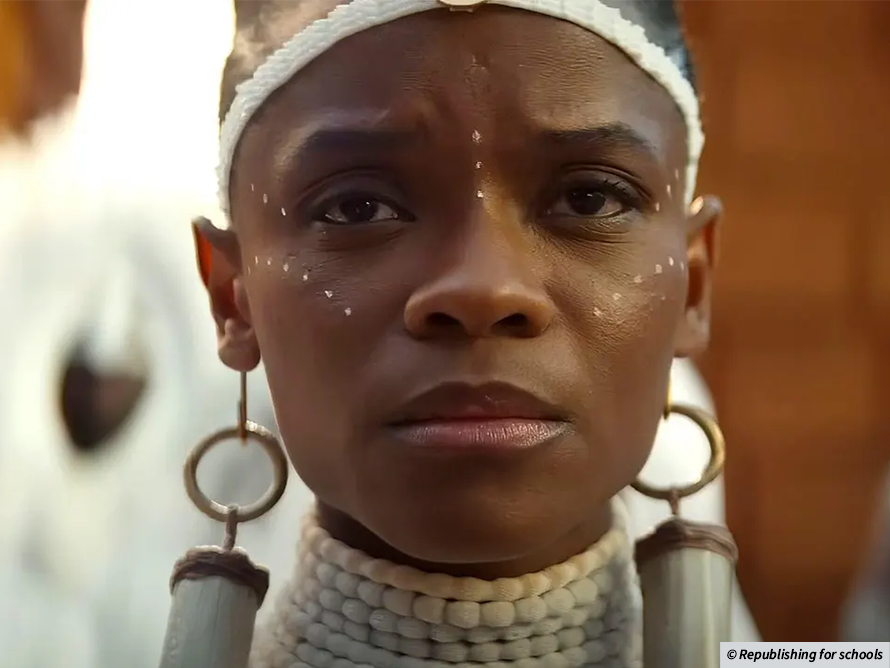Is the future African? Black Panther fans around the world are flocking to cinemas for the film’s much anticipated sequel. For some, Wakanda is just a fantasy, but for others, it is the future. The two women cling to each other, dressed in white, as they lead the funeral procession. One has lost a brother. The other has lost a son. But both have also lost a king. As they mourn, they know they face the biggest challenge of their lives: leading Wakanda. This is a scene from Black Panther: Wakanda Forever, the much anticipated Black Panther sequel, which airs in cinemas today. The grief shown in the film reflects real-life pain. In 2020, Black Panther’s star actor Chadwick Boseman, who played King T’Challa, died of cancer aged 43. This wave of grief reflected the impact the 2018 film had around the world. For millions of fans, Black Panther was like nothing they had seen before. As King T'Challa, Boseman led Wakanda, a fictionalised African nation, technologically superior to the rest of the world. A utopianImpossibly perfect. The term comes from an ancient Greek phrase meaning "no-place" invented by Henry VIII's chancellor, Sir Thomas More, in 1516, as the name of an imaginary, ideal island. country, where wealth and power are fairly distributed and natural resources are controlled by Africans. This futuristic fantasy looks dramatically different from the Africa we usually see in the news. It is often represented as a place dominated by war, disease and poverty. A region of the world that belongs to humanity's past, not its future. Wakanda is an alternative Africa, not limited by these negative stereotypes. It belongs to a cultural movement called AfrofuturismA diverse movement of writers, artists and musicians who draw on African history and culture to imagine the future., that envisions a world shaped by African technology and creativity. Could this soon be a reality? The UN expects Africa's population to double in the next 25 years, with 43% of Africans joining the global middle class by 2030.¹ With an average age of 20, compared to 43 in Europe, Africa is a young, growing and entrepreneurial continent that may dominate the next century. Africa lacks Vibranium, the alien metal that powers Wakandan technology. But still, a technological revolution is taking place on the continent. It is driven by mobile phone networks, which in the last decade have expanded to reach 93% of Africans. In countries with limited access to drinking water, electricity and waste disposal, phones provide solutions to everyday problems. Over 600 tech hubs across Africa are training coders and entrepreneurs, while Kenya is creating a "Silicon Savannah" to rival America's Silicon ValleyA global centre of technological innovation in Northern California. It is home to many start-up and global technology companies including Apple, Facebook and Google. . But is the future African? Wakanda forever Yes: Africa has untapped potential that will shape our future. Europe, America and China all went through dark periods of war and crisis before emerging as global powers that changed history. No: This is science fiction. Wakanda is a utopian vision of Africa without European colonialism and the plundering of its natural resources. The reality is a continent scarred by war, disease and climate change. Or… The future may one day be African. But in the short term, many say we should be looking to Asia, home to the two most populous nations and a hub of technology and innovation. KeywordsUtopian - Impossibly perfect. The term comes from an ancient Greek phrase meaning "no-place" invented by Henry VIII's chancellor, Sir Thomas More, in 1516, as the name of an imaginary, ideal island.
Keywords
Utopian - Impossibly perfect. The term comes from an ancient Greek phrase meaning "no-place" invented by Henry VIII's chancellor, Sir Thomas More, in 1516, as the name of an imaginary, ideal island.
Afrofuturism - A diverse movement of writers, artists and musicians who draw on African history and culture to imagine the future.
Silicon Valley - A global centre of technological innovation in Northern California. It is home to many start-up and global technology companies including Apple, Facebook and Google.
Black Panther’s legacy will ‘live on forever’
 In mourning: After King T'Challa's death, Wakanda becomes a matriarchy.
In mourning: After King T'Challa's death, Wakanda becomes a matriarchy. Glossary
Utopian - Impossibly perfect. The term comes from an ancient Greek phrase meaning "no-place" invented by Henry VIII's chancellor, Sir Thomas More, in 1516, as the name of an imaginary, ideal island.
Afrofuturism - A diverse movement of writers, artists and musicians who draw on African history and culture to imagine the future.
Silicon Valley - A global centre of technological innovation in Northern California. It is home to many start-up and global technology companies including Apple, Facebook and Google.
